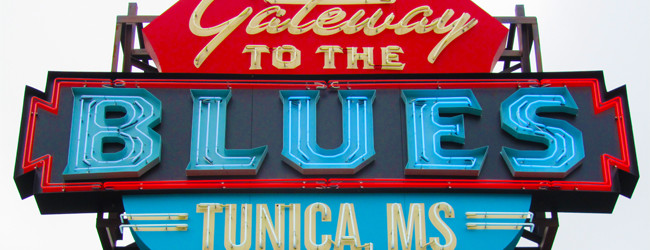
Countless bluesmen and blues music lovers have traveled down Highway 61 to celebrate and experience what Alan Lomax famously called “The Land where the Blues Began”. Now, nestled among Tunica’s grand casino destination, only a few short miles below Memphis, lies the charming gateway to the blues mecca that is the Mississippi Delta.
The Gateway to the Blues, located in Tunica, Mississippi, is one of the most unique visitor’s centers in the country. An endlessly photogenic neon sign in the shape of a highway badge adorns the top of the rustic cultural center — the newest stop on the blues highway. “All of us here in Tunica are excited about the opportunity to welcome music fans from across the globe to the Mississippi Delta,” says Webster Franklin, President of the Tunica Convention and Visitor’s Bureau.
The building, an ancient one-room train station, has found itself enjoying a new life; housing a celebration of the culture, warmth, and blues music in the area. Transported from Dundee, Mississippi, the Gateway building was meticulously restored with great care to retain it’s sovereign delta charm; the flaking paint, hardwood floors, and antiquated wood siding untouched from it’s decades as an abandoned icon of days gone by.
Inside, a beautiful collection of guitars line the high ceiling. Visitors can explore the Mississippi Blues Trail iPhone app through a large flat screen, letting people map out their own course to discover over a hundred trail markers. Hip blues merchandise gives fans a chance to wear their passion. Stacks of literature, fliers, and information on the history of the blues, visiting the delta, other area museums and blues attractions adorns walls and surfaces.
Possibly even more exciting than the endearing façade of the Gateway is it’s upcoming developments. A 4,000 square foot, state-of-the-art blues museum is deep into development, with a completion date of next year. The museum will boast unique and interesting features, such as a real studio where visitors can record themselves singing blues songs, as well as an impressive collection of guitars, some signed by blues and rock legends, others accurately representing the history and development of the guitar as an instrument. A trumpet owned by W.C. Handy, the father of the blues, will be featured. Blues music greats will narrate visitor’s paths past a working replica of the original cotton gin, diddley bows, and the development and evolution of blues music and beyond.
“It is our goal to develop a blues-oriented attraction,” Webster explains, “that not only appeals to all segments of todays traveler, but helps celebrate the unique contribution that Mississippi musicians have had on the past, present and future of American culture and music.”
Artfully living up to it’s “Gateway to the Blues” handle, the museum will have a number of integrated pointers to guide visitors to authentic, new, and exciting destinations along their delta excursion, including the historic Riverside Hotel, the birthplace of Elvis, the Crossroads in Clarksdale, B.B. King Museum, Dockery Farm, Club Ebony, and many more places of interest to blues and music enthusiasts.
The Gateway to the Blues, nestled on Highway 61 not far from where 69 merges on Tunica, is the latest must-stop for blues fans in their excursion through the rich musical magic that exists in the Mississippi Delta. A more fitting visitor’s center for the area could not have been imagined.
Gateway to the Blues Official Website


